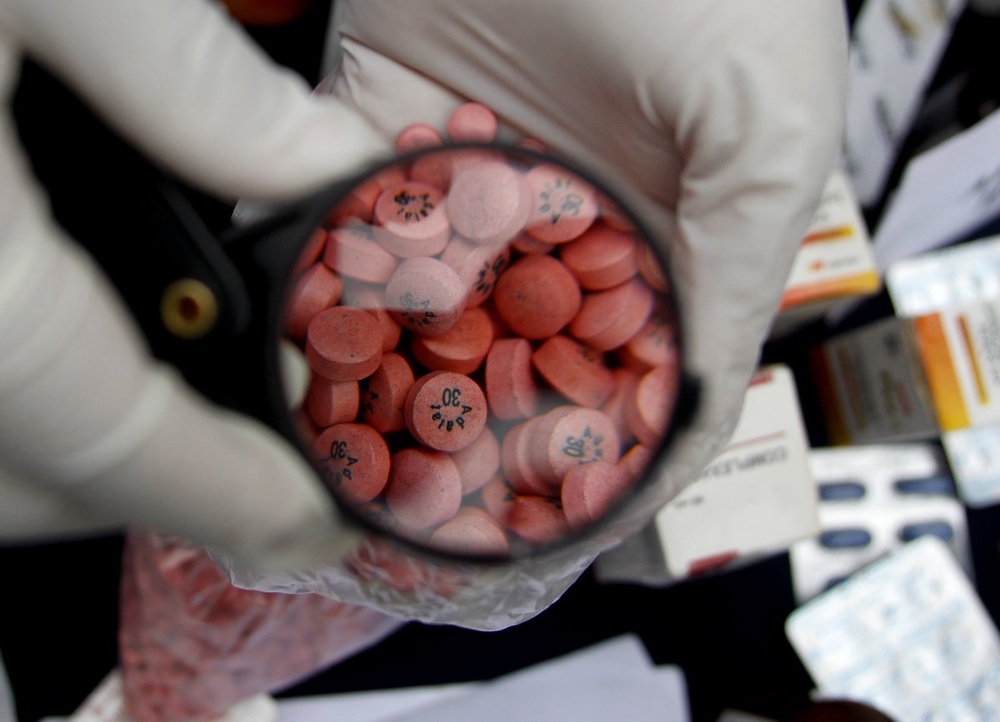
Global policing body Interpol announced Tuesday a pioneering initiative to crack down on trade in fake goods, using an app developed with the help of search giant Google, AFP reports. The Interpol Global Register (IGR), announced at a Google conference outside Los Angeles, aims to track illicit goods by verifying products through security features, using the scanning app. "Right now in special areas (like) pharmaceuticals, tobacco products and household goods, a consumer doesn't know what's fake and was real," Interpol chief Ronald Noble told AFP. "We came up with this idea that will allow a consumer or a law enforcement or businesses to scan a code and determine whether or not it can be verified as authentic," he added. "It becomes green or red. Green means verified, red means not verified." Google designed the application for this concept for Android devices, but Interpol plans versions for other platforms including Apple, Blackberry and Microsoft. One of its first users of the new system is PharmaSecure, a leader in drug authentication technologies, currently used to security code more than one million packets of pharmaceuticals produced every day in India alone. "Pharmasecure is proud to be the first to team up with INTERPOL to help consumers globally to verify their medicines through the INTERPOL Global Register initiative," said its co-founder Nathan Sigworth. Noble explained: "In India what they do is they put unique numbers on packages of pharmaceutical products. "The goal would be that if the product is supposed to go to country A and it's somehow in country C, and you scan it, it will come out as non-verified. It means that the consumer should be careful. "So, the same time it's being scanned, the country (where it was produced) knows it's being scanned. So it will be able to map where this illicit traffic goes." Interpol will also work with a group including British American Tobacco, Imperial Tobacco Group, Japan Tobacco International and Philip Morris International to make their supply chain control system accessible via the IGR. "Companies linking to the IGR will instantly become world leaders in securing their products and protecting consumers from fake and illicit goods, making the register an increasingly powerful tool," said Noble.





Global policing body Interpol announced Tuesday a pioneering initiative to crack down on trade in fake goods, using an app developed with the help of search giant Google, AFP reports.
The Interpol Global Register (IGR), announced at a Google conference outside Los Angeles, aims to track illicit goods by verifying products through security features, using the scanning app.
"Right now in special areas (like) pharmaceuticals, tobacco products and household goods, a consumer doesn't know what's fake and was real," Interpol chief Ronald Noble told AFP.
"We came up with this idea that will allow a consumer or a law enforcement or businesses to scan a code and determine whether or not it can be verified as authentic," he added.
"It becomes green or red. Green means verified, red means not verified."
Google designed the application for this concept for Android devices, but Interpol plans versions for other platforms including Apple, Blackberry and Microsoft.
One of its first users of the new system is PharmaSecure, a leader in drug authentication technologies, currently used to security code more than one million packets of pharmaceuticals produced every day in India alone.
"Pharmasecure is proud to be the first to team up with INTERPOL to help consumers globally to verify their medicines through the INTERPOL Global Register initiative," said its co-founder Nathan Sigworth.
Noble explained: "In India what they do is they put unique numbers on packages of pharmaceutical products.
"The goal would be that if the product is supposed to go to country A and it's somehow in country C, and you scan it, it will come out as non-verified. It means that the consumer should be careful.
"So, the same time it's being scanned, the country (where it was produced) knows it's being scanned. So it will be able to map where this illicit traffic goes."
Interpol will also work with a group including British American Tobacco, Imperial Tobacco Group, Japan Tobacco International and Philip Morris International to make their supply chain control system accessible via the IGR.
"Companies linking to the IGR will instantly become world leaders in securing their products and protecting consumers from fake and illicit goods, making the register an increasingly powerful tool," said Noble.


 +7 (777) 001 44 99
+7 (777) 001 44 99















































